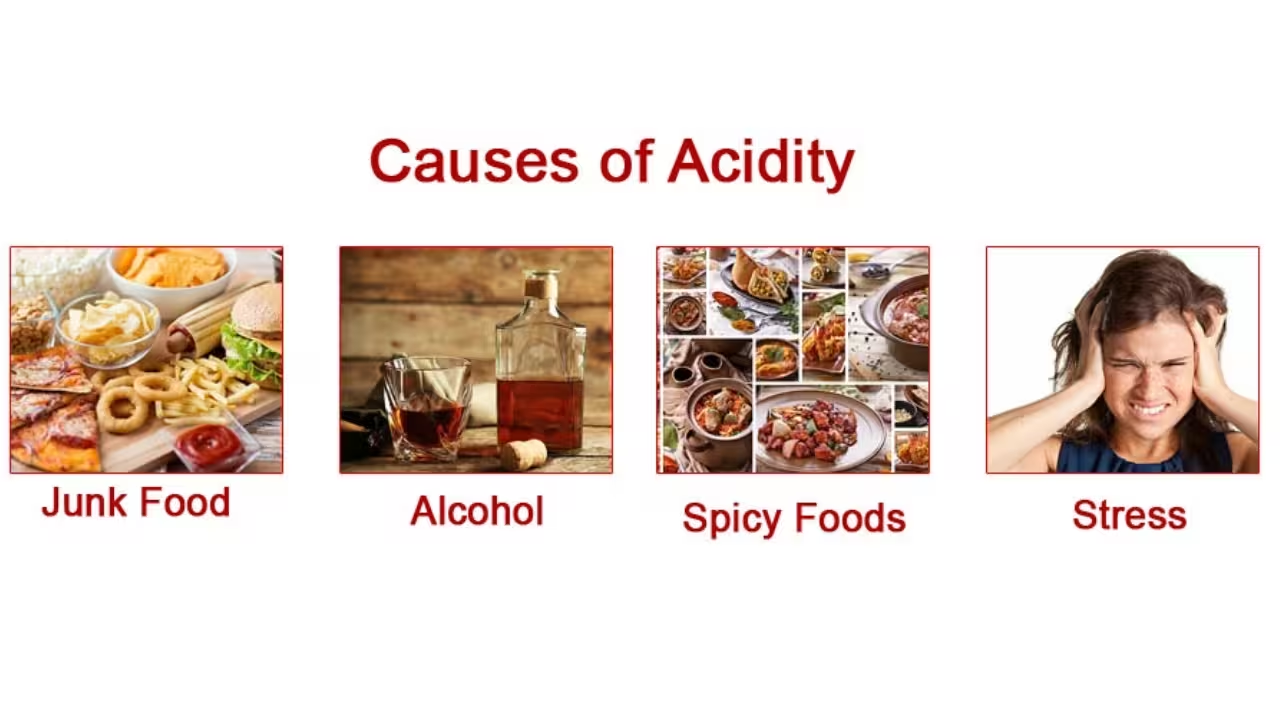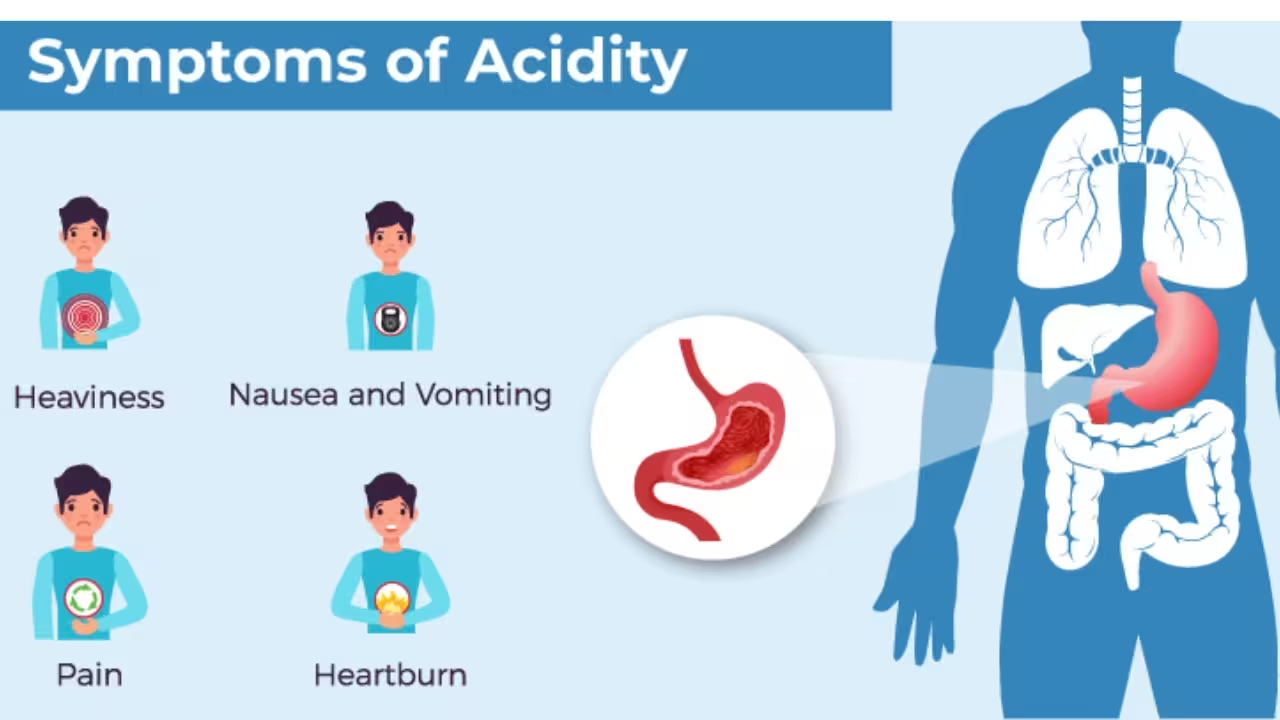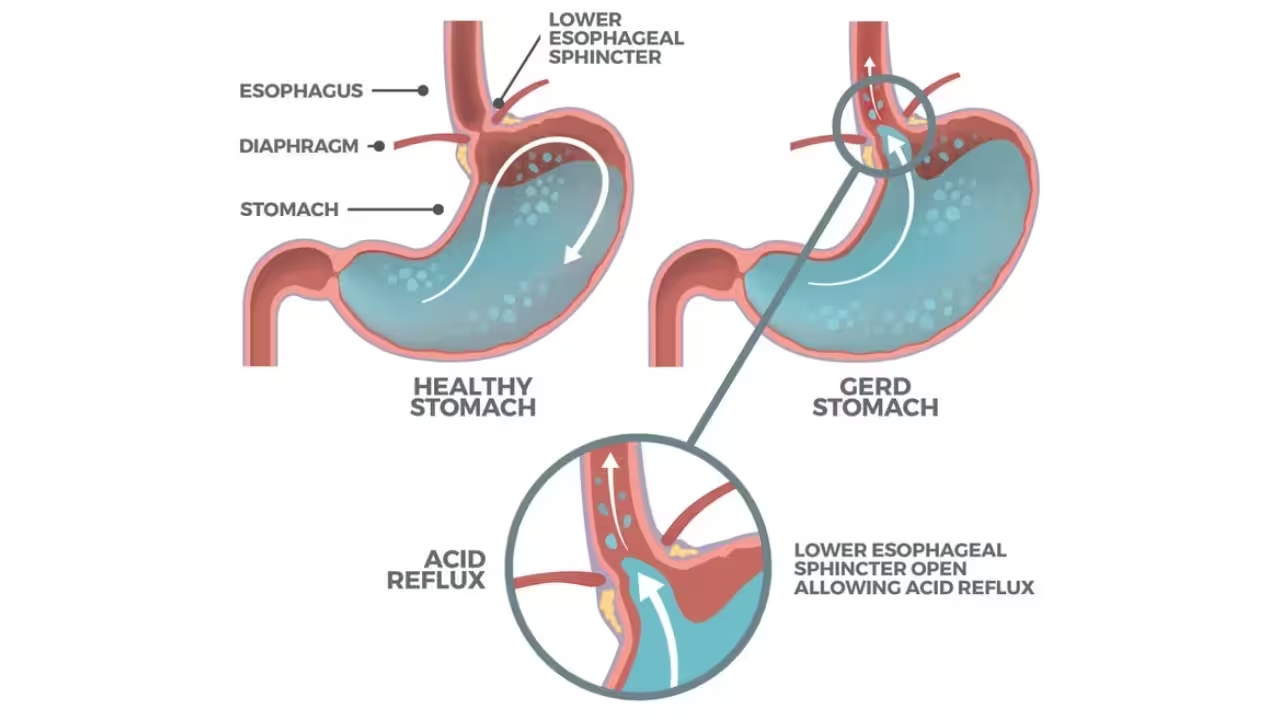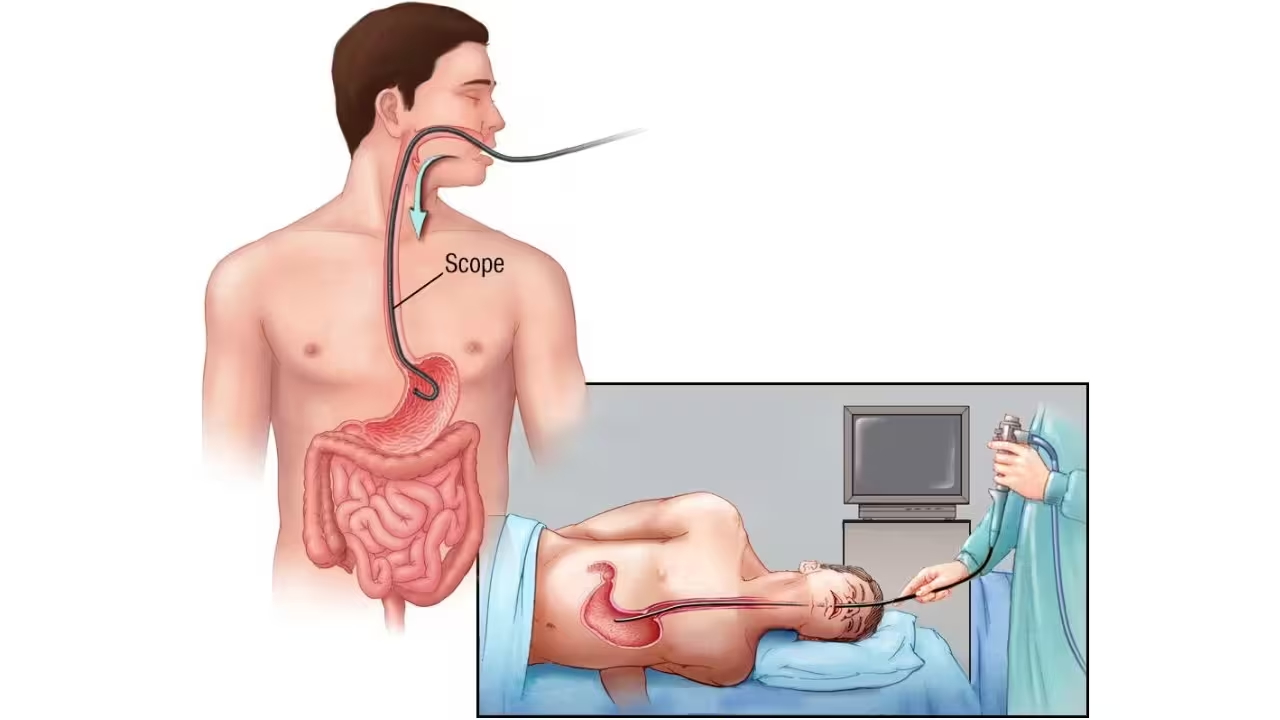Acidity – a word you’ve probably heard thrown around when someone complains about chest burn or a sour feeling after meals. But it’s way more than just discomfort from spicy food. Acidity happens when your stomach produces too much acid - and yeah, that messes with everything from your digestion to your focus and mood.
This blog breaks down what acidity is, its causes, symptoms, types, and what happens if it’s left untreated. Whether you’re prepping for exams or just tired of constant heartburn - this is your one-stop, student-friendly guide.
What Is Acidity? And Why Stomach Acid Isn’t Always the Villain
Acidity happens when your stomach makes too much acid - mainly hydrochloric acid (HCl). While the HCl in stomach function helps with digestion and killing germs, too much of it can lead to heartburn, sour burps, and discomfort.

Normally, HCl in stomach function helps break down food properly. But when the acid level goes up or the protective lining of the stomach weakens, the acid may travel upward into the esophagus. This leads to acid reflux, causing that familiar burning sensation in the chest, commonly known as heartburn.
Some of the earliest acidity symptoms include:
- A sour taste in the mouth
- Chest discomfort after meals
- Bloating, nausea, or burping
In short, while stomach acid is essential for Absorption of Digested Foods, too much of it can turn into a problem - and understanding that balance is the first step to managing acidity effectively.
Common Causes of Acidity (It’s More Than Just Your Diet)
Most of us blame spicy food for acidity - and sure, it plays a part. But acidity is actually triggered by a mix of your diet, daily habits, and even certain health conditions or medications.

Here’s a clear look at the main causes of acidity:
Food choices that increase stomach acid:
- Eating too much spicy, fried, or acidic food (like citrus fruits and tomatoes)
- Drinking excessive tea, coffee, or aerated drinks
- Irregular meals or skipping meals altogether
- Overeating, especially at night
Lifestyle habits that can make it worse:
- Smoking affects the stomach lining and increases acid
- Alcohol can irritate the stomach and increase acid production
- Stress plays a surprising role in triggering acidity
- Lying down right after eating – it pushes acid upward
Health conditions that may lead to acidity:
- Acid reflux (GERD) – when acid flows back into the esophagus
- Gastritis – inflammation in the stomach lining
- H. pylori infection – a bacteria that throws off acid balance
- Issues like obesity or pregnancy, which add pressure on the stomach
Certain medications that cause acidity:
- Non-steroidal painkillers (NSAIDs)
- Steroids, some antibiotics, and even iron supplements
Symptoms of Acidity – What Your Body’s Trying to Say
Sometimes your stomach tries to tell you something, and acidity symptoms are its not-so-subtle warning signs. These symptoms can be mild at first, but if they happen often, they may point to symptoms of acid reflux disease or excess stomach acid.

Here are the most common signs to look out for:
Classic acidity symptoms:
- Heartburn – a burning feeling in your chest, especially after meals or while lying down
- Sour or bitter taste in the mouth that annoying acid rising up
- Chest discomfort or heaviness after eating
Other common signs:
- Burping or feeling bloated
- Nausea or a general sense of indigestion
- Sour belching or stomach gurgling sounds
More severe or chronic symptoms:
- Difficulty swallowing is called dysphagia.
- Persistent cough, sore throat, or a hoarse voice
- Feeling like there’s a lump in your throat
Is it acidity or GERD?
If these symptoms are happening more than twice a week and interfering with daily life, you might be dealing with GERD (Gastroesophageal Reflux Disease) - a more serious, long-term form of acidity.
So yeah, that annoying burn or weird burp after food? It’s not just random. It’s your body signaling that your stomach acid might be going rogue.
Types of Acidity Issues – From Mild Discomfort to Chronic GERD
Not all acidity feels the same. For some people, it’s just occasional discomfort after a heavy meal. For others, it’s a daily struggle. Let’s break down the main types, so you know what’s mild and what needs proper treatment.

1. Mild or Occasional Acidity
- Shows up once in a while - usually after eating spicy, oily, or late-night food
- Easily managed with basic acidity home remedies or small diet changes
- Common if you skip meals, eat too fast, or overeat during one sitting
2. Frequent Acidity
- Happens more than just “once in a while” - maybe a few times a week
- Might need antacid medications or regular lifestyle changes
- You’ll feel heartburn, bloating, or heaviness often after meals
3. Acid Reflux (GERD)
- This is a more serious, long-term condition where acid keeps flowing back up
- You may feel constant heartburn, a sore throat, chest pain, or trouble swallowing
- Needs proper diagnosis and long-term treatments for acidity
4. Silent Reflux (Laryngopharyngeal Reflux)
- No classic burning feeling, but other symptoms like hoarseness or a lump-like feeling in your throat
- Damages your voice box and throat over time without obvious signs
- Needs attention because it’s often missed until it gets worse
Bottom line: not all acidity is the same. If it's frequent or feels unusual, it’s best to get it checked early rather than wait.
What Happens If You Ignore Acidity? (It Gets Serious Fast)
Acidity may start small, but if it keeps happening and you don’t manage it, it can lead to serious health issues. Here’s how long-term or untreated acidity can affect your body:
.avif)
1. Damage to the Esophagus
- When stomach acid frequently moves upward acid reflux, it can hurt the lining of your esophagus
- This can cause esophageal ulcers, bleeding, or even make it painful to swallow
2. Barrett’s Esophagus
- A long-term result of constant acid exposure, where the cells in your esophagus start changing abnormally
- It increases the risk of developing esophageal cancer, especially if ignored for years
3. Constant Discomfort in Daily Life
- Even if it’s not severe, frequent acidity symptoms like heartburn, nausea, or bloating can ruin your focus, sleep, and appetite
- You may feel anxious about eating or uncomfortable during classes, exams, or regular work
4. Risk of Chronic GERD
- Occasional acid reflux can turn into GERD (gastroesophageal reflux disease) - a condition that needs long-term care and sometimes strong acidity reflux medicine
- GERD doesn’t go away on its own - the longer you wait, the harder it gets to manage
Diagnosis – Tests That Help Doctors Confirm Acidity
Acidity isn't just about a burning chest or a sour burp - when it keeps coming back, doctors dig deeper. Here’s how they figure out if it’s just regular acidity or something more serious like acid reflux disease or GERD.

- When should you see a doctor?
If you’re constantly getting heartburn, bloating, or a sour taste, and home remedies for acidity aren’t helping anymore - it’s time to check in. Especially if symptoms happen more than twice a week or affect your sleep.
- Endoscopy
This is a test where a small camera goes down your throat to look at your food pipe and stomach. It helps doctors spot ulcers, inflammation, or damage caused by too much acid.
- pH Monitoring Test
If they suspect serious acid reflux, they might use a pH test - it measures how often acid flows up into your food pipe in a day. It’s the best way to confirm long-term reflux (GERD).
- H. pylori Test
Sometimes acidity is due to a stomach infection caused by Helicobacter pylori. Doctors may do a breath, stool, or blood test to check for it. If it’s positive, antibiotics will be part of the treatment.
Home Remedies & Prevention – Easy Fixes That Actually Help
Not every case of acidity needs strong medicine. In fact, small daily changes and natural remedies often work good - especially for early or mild acid reflux issues.
.avif)
If you’re looking for a simple acid cure at home, the fixes below might be just what your stomach needs before you reach for strong meds.
1. Watch what you eat
Spicy, oily, fried, and sour foods can trigger acidity symptoms. Try eating smaller meals, chew slowly, and avoid lying down right after eating. Skip foods like tomatoes, coffee, chocolate, and soft drinks if you notice a reaction.
2. Time your meals better
Late-night dinners or skipping meals can mess with your digestion. Aim for a regular eating schedule - and keep a gap of at least 2 hours between dinner and bedtime.
3. Manage stress
High stress - high acid. Try meditation, deep breathing, or light exercise. Even 10 minutes of calm can help reduce reasons for acidity.
4. Try safe home remedies
Some people find relief with things like:
- Cold milk (not flavored)
- Basil (tulsi) leaves
- A spoon of jaggery or fennel seeds
- Ginger tea (in moderation)
These acidity home remedies can give mild, quick relief - but if the issue keeps coming back, you’ll need more than kitchen fixes.
5. Avoid smoking & alcohol
Both weaken the valve between your stomach and food pipe, making it easier for acid to flow upward.
For those uncomfortable flare-ups, these are some go-to remedies for burning stomach that work well if used regularly.
Medical Treatments – From Antacids to Long-Term Therapies
When acidity symptoms or acid reflux don’t settle with home tips, doctors may suggest one of these treatments:

1. Antacids (For Quick Relief)
- Antacids are often considered an instant cure for acidity, especially when symptoms like heartburn or sour burps strike suddenly.
- These work fast by neutralizing stomach acid.
- Best for occasional heartburn or bloating after spicy meals.
- Common ones: Gelusil, Eno, Digene.
2. H2 Blockers (For Short-Term Relief)
- They reduce the amount of acid your stomach makes.
- Helpful if you get acidity or burning a few times a week.
- Examples: Ranitidine, Famotidine.
3. Proton Pump Inhibitors – PPIs (For Long-Term Relief)
- PPIs are one of the most effective forms of acidity reflux medicine for people dealing with long-term acid problems.
- Stronger than H2 blockers.
- Used in chronic acid reflux or if you have GERD.
- They reduce acid at the source - inside the stomach lining.
- Examples: Pantoprazole, Omeprazole.
4. Prescription Treatments
- If acidity is due to an infection like Helicobacter pylori, a doctor may give:
- A combo of PPIs + antibiotics
- Or stronger acid-suppressing meds
- These are only given after tests confirm the cause.
5. Surgery (Rare but Possible)
- Only for severe or long-term untreated acidity issues.
- Surgery like fundoplication is done to stop acid from flowing back up.
- Usually done when meds for stomach acid stop helping.
Complications If Left Untreated – When Acidity Crosses the Line
Mild acidity may feel harmless, but ignoring it for too long can lead to bigger problems. Here's what can happen if it’s not treated on time:
.avif)
- Esophageal Ulcers
Constant acid can damage your esophagus lining, leading to painful open sores. These ulcers can cause sharp pain, bleeding, and difficulty while swallowing.
- Barrett’s Esophagus
With long-term untreated acid reflux, the normal cells in the esophagus can change. This condition raises the risk of esophageal cancer in the future - especially if symptoms are ignored for years.
- Chronic Sore Throat & Cough
Acid that rises up can irritate your throat constantly. You may feel like you have a sore throat that won’t go away, or keep coughing even when you're not sick.
- Breathing Issues or Asthma-Like Symptoms
Refluxed acid can sometimes enter the airways and make asthma worse - or trigger wheezing and breathlessness in some people.
- Chest Pain or Discomfort
Severe, untreated heartburn might feel like chest pain, especially after meals or when lying down. It’s uncomfortable and can mimic heart problems.
- Poor Sleep & Daily Disruption
Nighttime acidity disturbs sleep, causes restlessness, and makes you avoid meals out of fear - all of which impact your focus, mood, and energy levels.
Ignoring acidity doesn’t just mean putting up with discomfort. It affects your digestive system, throat, sleep, and even lungs over time.


.svg)










.avif)








